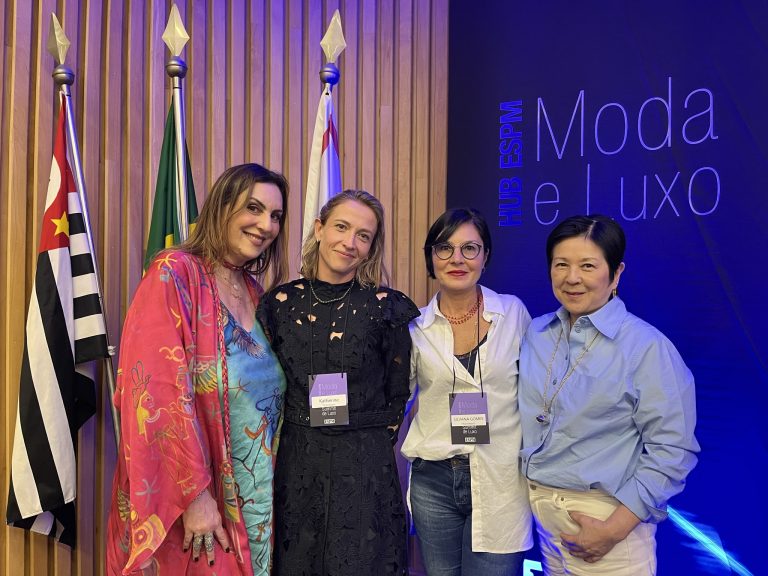São Paulo – Brazilian brands have distinctive, innovative designs capable of winning over customers worldwide but need more presence at international events to be recognized. In addition, promoting collaboration between other brands and companies can be another way to be more present in consumers’ lives. These were two conclusions presented in the panel “Luxury Experiences Marketing” in the second edition of the ESPM Luxury Meeting. The meeting was organized by the Fashion and Luxury hub of Escola Superior de Propaganda e Marketing (ESPM) college, on Thursday (17) evening, in São Paulo (in the opening picture, the panel participants).
The executive manager of the Brazilian Association of Fashion Designers (ABEST), Aurea Yamashita, said at the meeting that Brazilian products have their concepts, designs and innovative solutions recognized abroad; however, Brazilian brands in the sector still need to be more present at global events and focus on finishing and quality of the materials.
“Brands need to be seen to be remembered. You have to go to shows and participate in events abroad because representatives of big brands are always there; they look at what is being produced. It is also necessary to train professionals and invest in the quality of ‘the materials,” said Yamashita. ABEST has an internationalization project in partnership with the Brazilian Trade and Investment Promotion Agency (ApexBrasil), Fashion Label Brasil, which promotes the internationalization of companies in the sector. “The Brazilian government invited us for several actions because fashion attracts and moves with people’s emotions,” she said.
The Marketing & Content director of the Arab Brazilian Chamber of Commerce (ABCC), Silvana Gomes, stated another initiative is essential for a brand to be present in society: Collaborations, or “collabs” between companies and brands. “Sharing values between companies with similar organizational cultures. For Arabs, relationships, family, and origin are very important. Successful collabs came from companies with organizational cultures articulating with each other,” she said during the panel mediated by professor Katherine Sresnewsky.
Business with Arabs
Silvana also observed attention to actions, gestures, and ceremonies is essential to establish lasting connections with Arab clients. “At the ABCC, we are mindful of the brand identity; our headquarters have elements that refer to Arab cultures, we seek to present contemporary Arab music in events with ambient sound, we do not use anything that refers to silver, but to the gold, because everyone expects the luxury of the Arabs and we are golden, not silver,” she exemplified.
With extensive experience in doing business in the Arab world, businesswoman Julia de Biase presented her history in relations with the Arabs. After a trip to the Arab countries in 2009, she became enchanted by the fragrance of local perfumes. She decided not only to import them to Brazil but to represent one of the largest local perfume companies in America, Asgharali.
After attempts and bureaucratic obstacles, she started importing the company’s perfumes from Bahrain to Brazil in 2013. Today, she also represents the Date Crown brand and is the founder & CEO of Al Ward, which sells Arabic products in Brazil. Al Ward also has a café and a store selling products from the Middle East and North Africa in Jardim Paulista, in São Paulo city. “For the Arabs to do business, they want to get to know you, learn about your life, and have lunch or dinner with you. Only then will they close the deal, talk about trade,” says Julia about learning from suppliers and customers in the Middle East and North Africa.
Translated by Elúsio Brasileiro




